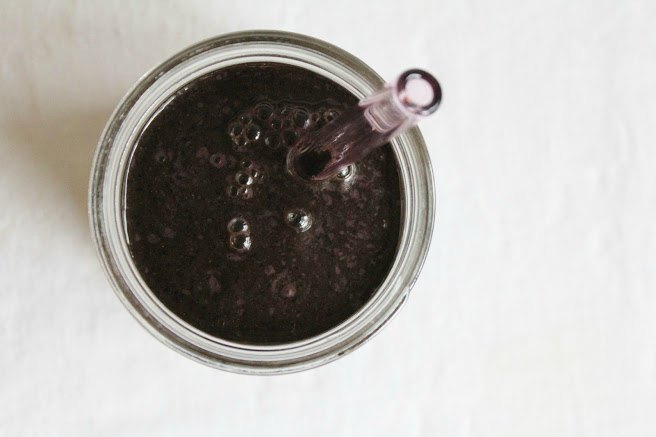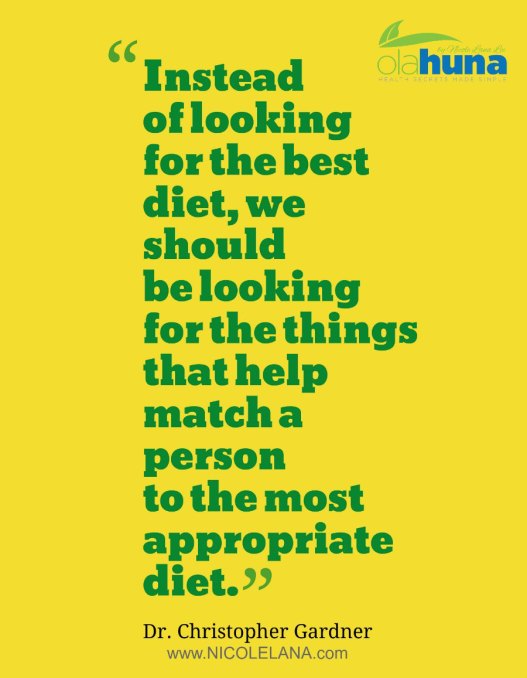

Six-pack abs.
Rounder butt.
Stronger arms.
More sexual desirability.
Better (and more) sex!
Why else would you suffer through a gruelling diet, sets and sets of deadlifts, 2-hour workouts, DOMs and burning sit-ups (ouch!)
Ok, I’m just being blunt here. Even if you don’t like to admit it, I think most of you wouldn’t mind having a fitter and nicer looking body, whatever that means, or maintain what you’ve already got (lucky you!)
So as you google “How to lose weight or how to bulk up” (especially after the holidays) you maybe finding mixed messages…
Some experts may come out and say “Avoid the carbs! All carbs are bad for you”, while others may say “Ditch the FAT and carb up.” And it seems like each guru has a point…
So who’s right?
This is why I’ve invited world-renowned Dr. Christopher Gardner, Director of Nutrition Studies at the Stanford Prevention Research Center and Professor of Medicine at Stanford University, to discuss his recent research findings and thoughts on weight loss with us. Dr. Gardner’s recent work includes the A to Z Comparative Weight Loss Study that was published in Journal of the American Medical Association.
We’re going to discuss Dr. Gardner’s weight loss study, his most recent research findings, and find out why different people can be on the same diet and workout routine, and one may fail, while the other may succeed.
This is going to be a 4-part interview series. Below is our video interview and an edited version of the transcript.
Story At-a-Glance
- Even though the Atkins diet did better than the next low-carb group, the weight loss on both the low-carb as well as low-fat diets in studies is disappointing because various factors such as genetics or metabolic factors were not taken into account
- You can be on the same diet and exercise regime as the other person and your weight loss results can be different; so weight loss is not really about how hard you work
- Instead of looking for the best diet, we should be looking for the things that help match a person to the most appropriate diet
So, most people have friends that have tried the same diet and got different responses, right. So why is that? At some point you can say, oh, one person was lazy and one person tried really hard. If they tried really hard, they would have made it work.
NO, we have people trying really hard on both diets and failing; and we have people trying really hard on both diets and succeeding. – Dr. Christopher Gardner
Video
Background
Q: How and why did you choose to start out in nutrition studies and research?
Dr. Gardner: Well, I didn’t. I, actually, was a philosophy major in Upstate New York. I wanted to experience some life. I promised myself a whole set of adventures and then I’d know exactly what I wanted to do when I was done. I didn’t know what I wanted to do.
I had spent a lot of time being a waiter and a manager in restaurants, and I’d become a vegetarian along the way. Somehow, I decided six years outside of graduating with a philosophy major that I’ll start a vegetarian restaurant.
But before I did that, I thought I’d take some classes in case people ridiculed or challenged me, I wanted to have a very articulate answer. And originally, when I was in college as the philosophy major, I thought college was kind of dumb, I didn’t need it.
I wanted to just get a job. All of a sudden I really liked school again and the whole thing got out of control. I ended up getting a PhD in nutrition and then getting a faculty job at Stanford. Now I do lots of research studies and I never opened the restaurant.
Q: So how did you decided to be a vegetarian at that time?
Dr. Gardner: Well, it’s pretty selfish. Tiffany dumped me and I thought if I became a vegetarian, I’d get Tiffany back. It didn’t work but I liked being a vegetarian.
So I’d actually say that I’m more of an ethical vegetarian. When I was a kid, I never went hunting, I never went fishing, and I can’t even put a worm on a hook. And so, it ended up being more internally consistent with my values. So that’s why, I’m more of an ethical vegetarian.
Q: Great. Now how has your view towards nutrition changed in the last few years, based on your work?
Dr. Gardner: Being on Stanford faculty, I already exceeded all my personal expectations – I was getting to do NIH funded studies, publishing medical journals and going to conferences.
I got to do some pretty cool stuff and at the end of the day, I noticed that I wasn’t really impacting behavior very much by addressing some health concerns. So, should you or shouldn’t you eat this because it will raise your cholesterol or lower it, raise your blood pressure or lower it, those sort of normal health things.
I was finding things out but people would say, “I know that but this tastes really good” or, “It’s really inexpensive” or, “It’s down the street for me and so, I’m going to eat it anyway, even though I know it’s not good for me.”
And so, about five years ago, I started attending this speaker film series on campus. It was all about the ethics of food in the environment, which rang true to me, given that I just told you I’m more of an ethical vegetarian than anything else.
And the speakers and films never talked about health. They talked about animal rights and welfare and global warming and human labor abuses and these venues on the Stanford campus were packed with people.
I thought, “Oh my gosh. Has anybody read my article in the journal in the American Medical Association? Anybody out there know of my work? No. Nobody knows of my work but these issues, these societal value issues, really resonate with you.”
So, a friend and I decided that we’d try to do some research on social responsibility and engagement which never got funded. I think we were ahead of our time, and we decided we needed some pilot data and our targets were young adults. I thought, “Well, let’s see where we could get young adults in a research study. Oh yeah, Stanford undergraduates.
We have a whole captive audience at Stanford undergraduates. So we started a class called Food and Society and we collected data in our class, and we never mentioned health.
We only focused on those societal values type issues and in our class, the students, almost, to the last one listened, got engaged, got upset, got passionate and changed their diets, all in ten weeks listening to these non-health issues.
We’ve actually published a paper on it in American Journal of Preventive Medicine. And so, that completely shifted my thinking like, “Yes. We should have the underpinnings of health in this nutrition stuff we do… but if you really want people to change their behaviours, it’s so complicated.”
We had ended up getting a lot of Stanford faculty come and give guest lectures in our class. They were from law, business, engineering, earth sciences, and education. So eventually, I started realising, I’m in my little bubble in the medical school and I didn’t actually know how many schools Stanford had. As a university you have to have multiple schools.
So I learned that there were seven schools on our campus and so, in 2010 we held our first Stanford food summit and two weeks ago, we held our fifth annual Stanford food summit.
And what I now can appreciate, which I did not five years ago, is that if your bring business, legal and earth sciences, biology and anthropology perspectives… if you bring all these disciplines around food, you have a much better chance of creating actual and meaningful behaviour change..

Low Carb vs. Low Fat: Why No One Diet Fits All
Q: Let’s talk a little about your study that’s funded by the NIH. In that five-year low carb versus low fat study, it was concluded that women followed the Atkins diet lost more weight versus other diets. Did this conclusion surprise you initially? What do you think contributed to this conclusion?
Dr. Gardner: Okay. I need to reframe that a little. So they (the Atkins) did better than one other group. They did better significantly than the next low carb group.
So there were four diets, the lowest carb and intermediate low carb, a low fat and a really low fat.
The only two that were statistically different were the two low carb diets.
So Atkins, the lowest carb diet, technically, wasn’t different than the low fat or the really low fat. It did surprise me.
I actually went into the experiment thinking that the low fat would be the best one because that’s what has been said forever. I looked at a bunch of other studies actually, right around the same time. A lot of people were trying to do low fat, low fat never won. It never beat the low carb diet.
Now to be realistic, on the other hand, the low carb diet never really compellingly beat the low fat diet either.They both did pretty similarly and the disappointing thing was, if you really look closely at all the studies, the weight loss on both of them was disappointing.
For example, in our study, if you go back to our paper that average weight loss in the group that lost the most weight at the end of the year was about 10 pounds and these were 311 women who signed up for the study, who had 15 to 100 pounds to lose.
So going into the study, they wanted to lose 30 or 40, 50 pounds and on average, they lost 10 and that was the group that lost the most. The other groups, on average, lost 5 or 4 or 3 pounds, which was, still statistically significant within their own group. So they still lost more weight than they gained but pretty disappointing.
But I was much more fascinated looking at all four groups in all four diet groups. Some of the women lost 40, 50 or 60 pounds and some gained 5 or 10 pounds. So, in every group, there is like a 40, 50 pound range of response to the same diet.
I thought that was much more fascinating that you could assign people to the same diet and get that range rather than focusing on a few pounds difference on average between the groups.
So, really, to reframe the way you stated that at the beginning, that Atkins group did a little better. To be honest, they did not really do a whole lot better. They really just did a little better and what was way more fascinating was the variability of response in all four of the diet groups.

Q: Can you elaborate on that?
Dr. Gardner: Not more than saying, yeah, they lost 50 pounds or gained 10 pounds on the same diet.
Q: Why do you think that is the case?
Dr. Gardner: Okay. So that’s our next ongoing study. I don’t have the answer yet but we are two years into a new five-year study. This time, we have 600 people and this time, its men and women. This time, we’re not following anybody’s rules or book, we created our own set of guidelines for what we think would be the healthiest possible low-fat diet, and the healthiest possible low-carb diet.
We designed these diets and we designed them to start out being super low, really ambitious goals for both of them. We tell people that we think some people are predisposed to do better on one diet and another and we’re not trying to match them. We’re intentionally randomizing them.
We’re intentionally expecting some people to fail on the diet that they got assigned to and we’re expecting to find later that because of the genetics or metabolic factors or even microbiotic factors.
I don’t know if I can say this out loud to our listeners but we are collecting their sh*t. We’re up to our eyeballs in poop because we’re growing up the bacteria from their colon.
We think the bacteria in their colon might be another source of individual variability.
So that down the line, if you knew how to type someone for their genetic characteristics, their metabolic characteristics and their microbiotic characteristics, we might be able to help explain this very thing that you just asked.
If you want me to expand on it, I think people have this predisposition to one or the other.
So, most people have friends that have tried the same diet and got different responses, right. So why is that? At some point you can say, oh, one person was lazy and one person tried really hard. If they tried really hard, they would have made it work.
NO, we have people trying really hard on both diets and failing; and we have people trying really hard on both diets and succeeding.
So I think what we really owe the world is a more nuanced understanding.
Instead of looking for the best diet, we should be looking for the things that help match a person to the most appropriate diet.
Q: And that’s probably why you think in the previous study, the results for both, low carb as well as low fat diets, were pretty disappointing because they didn’t take in to account of those factors?
Dr. Gardner: And so that average is disappointing. But there are people who did really well.
There are women from the old study who did super well. So, yes, our underlying hypothesis would be that they ended up randomly getting matched to the diet that suited them really well but we just didn’t appreciate that we were not measuring the kinds of things that would have helped us differentiate what those factors were. So that’s what our new study is all about.
This leaves us to the end of this part.
In our next part, we’ll discuss why some people are more successful on a low-carb/low fat diet, and the role insulin plays in weight loss.
You can sign up HERE for updates on the next part.
And remember to share this quote!


